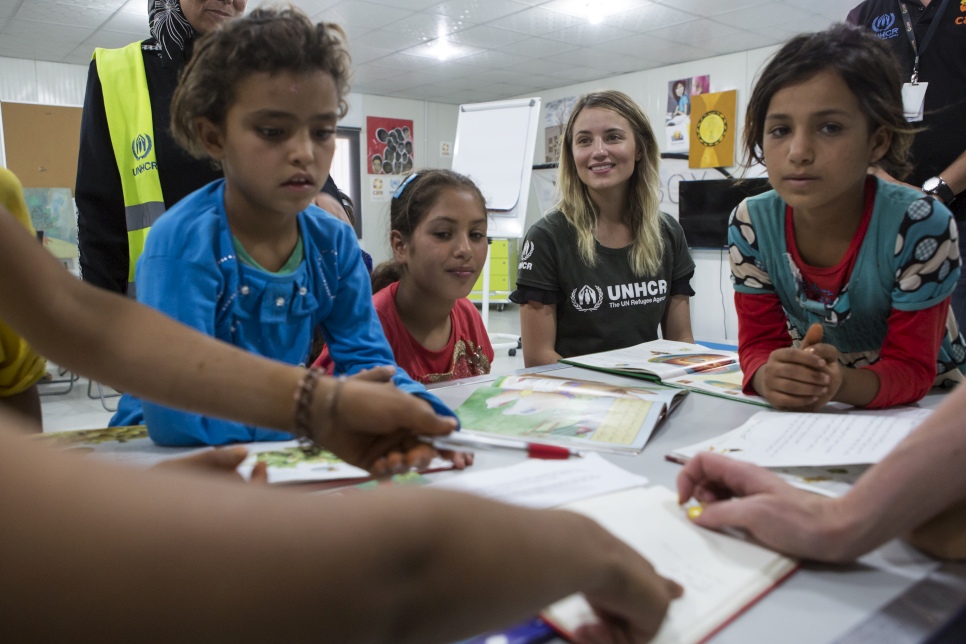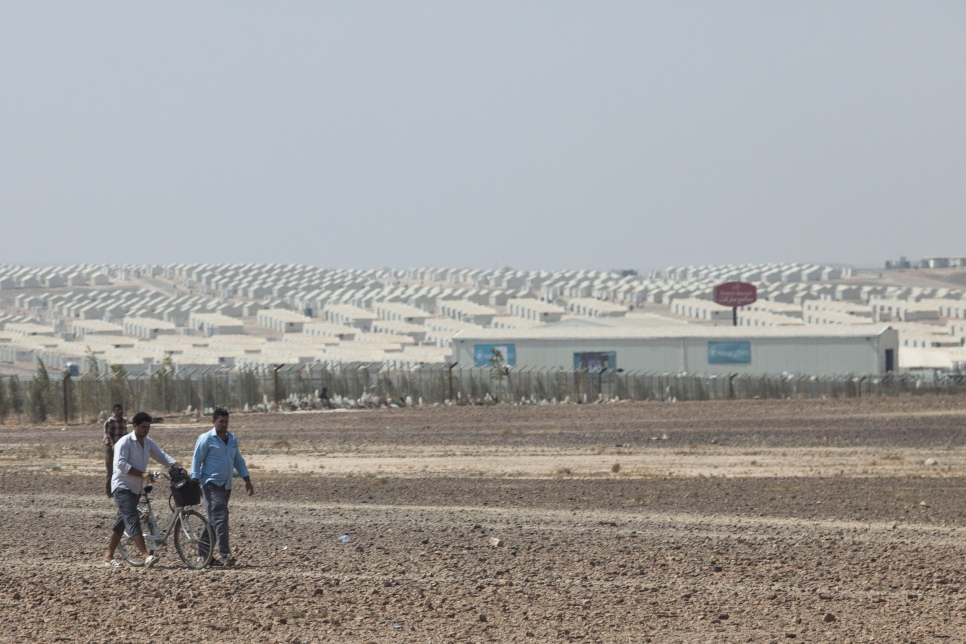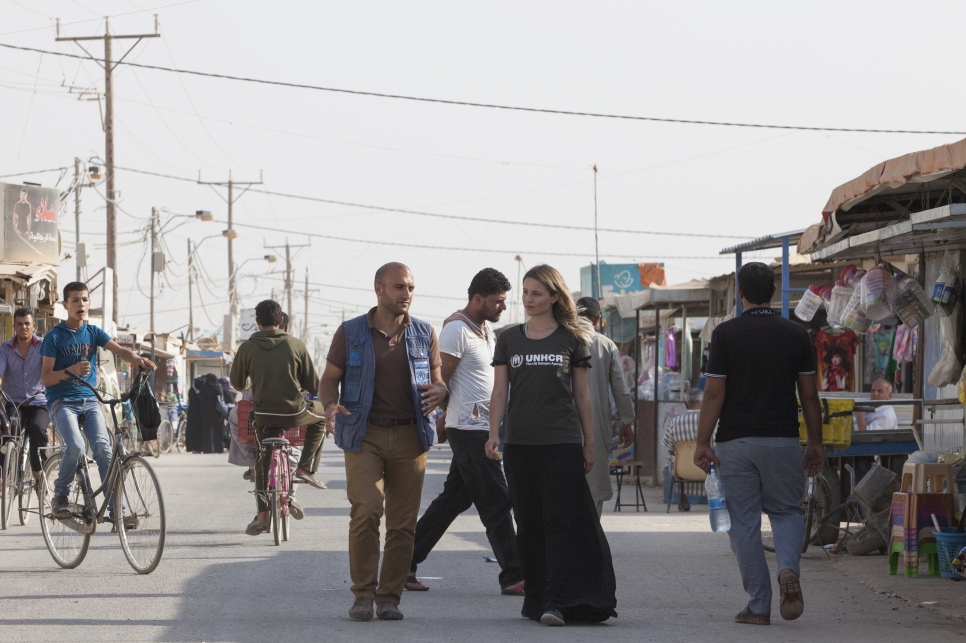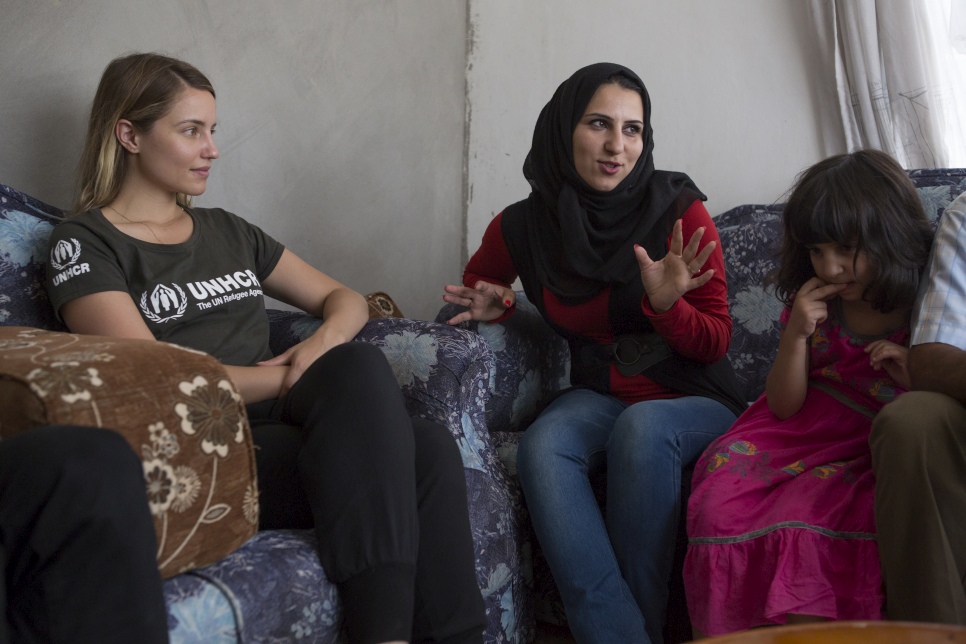In Photos: UNHCR High Profile Supporter Dianna Agron meets Syrian refugees in Jordan
UNHCR High Profile Supporter Dianna Agron traveled Jordan to meet Syrian refugees in August 2016. She shared her experiences through the first ever takeover of UNHCR's official Instagram account. You can view her reflections below.
9 August 2016
-
 Dianna's introductory post in advance of her UNHCR mission © Dianna Agron
Dianna's introductory post in advance of her UNHCR mission © Dianna Agron -
 Dianna's second post in advance of her mission © Dianna Agron
Dianna's second post in advance of her mission © Dianna Agron -
 "Let me introduce you to this group of young girls I met in a Community Center in Azraq refugee camp. They were a bundle of smiles and very curious about us and who we were. They told me about how much they love to come to the center so they can meet their friends and read books together. They showed me how to write their names in Arabic and in English. When I got up to leave a couple of them slipped their hands into mine and followed me around for the rest of my time there. I was very touched by their immediate trust and the love they showed me. " © UNHCR/Jordi Matas
"Let me introduce you to this group of young girls I met in a Community Center in Azraq refugee camp. They were a bundle of smiles and very curious about us and who we were. They told me about how much they love to come to the center so they can meet their friends and read books together. They showed me how to write their names in Arabic and in English. When I got up to leave a couple of them slipped their hands into mine and followed me around for the rest of my time there. I was very touched by their immediate trust and the love they showed me. " © UNHCR/Jordi Matas -
 "Azraq is the second biggest camp for Syrian refugees here in Jordan. It is like nothing you've ever seen. The terrain is a light brown and together with the uniform buildings it resembles something out of a sci-fi movie. It seems so anonymous and impersonal but once you get up close there are people everywhere. There are community centers - places to read books, places for kids to play soccer, and areas for adults to learn new skills. You might see classes for tailoring or hairdressing - people want practical skills they can use to earn a small wage. People are living in an environment that is a far cry from their lives back home in Syria, yet once you step into this lunarscape everyone is so friendly, welcoming, optimistic, open and caring." © UNHCR/Jordi Matas
"Azraq is the second biggest camp for Syrian refugees here in Jordan. It is like nothing you've ever seen. The terrain is a light brown and together with the uniform buildings it resembles something out of a sci-fi movie. It seems so anonymous and impersonal but once you get up close there are people everywhere. There are community centers - places to read books, places for kids to play soccer, and areas for adults to learn new skills. You might see classes for tailoring or hairdressing - people want practical skills they can use to earn a small wage. People are living in an environment that is a far cry from their lives back home in Syria, yet once you step into this lunarscape everyone is so friendly, welcoming, optimistic, open and caring." © UNHCR/Jordi Matas -
 "I spent some time in the home of Um Mohammad and two of her sons, Mohammad and Ahmed, in Azraq. Um Mohammad is a widow and her older children are scattered between here in Jordan, Turkey and back home in Syria. I was so moved by Um Mohammad's commitment to her children's safety and education which is what ultimately helped her make the decision to flee their home. Her eldest son, a doctor in Syria, helped her and the two youngest boys escape Syria but he wouldn't cross the border with them. He says that he will never leave Syria, that there are too many people in need of help inside Syria, and too few doctors left. He wants to be able to help as many people as he can in these dangerous times. It really struck me to hear how much the families fleeing conflict are torn apart – huge sacrifices are made – parents separated from children, brothers from sisters. This family have not seen each other together for almost three years and in all likelihood it will be some considerable time before they are united again. Um Mohammad showed me a few pictures of their old home taken on her phone. It was big and beautiful and set in glorious countryside. Bikes in the front yard, swings in the garden. When the family left they packed quickly and lightly. They closed and locked the front door and took the key. They thought they would only be away for a matter of weeks and then it would be safe to return. The next photos Um Mohammad showed me were sent to her sometime after they had left. They were of the same house – their home – but this time semi destroyed by what must have been some kind of bombardment. I can't imagine leaving everything you know, losing everything you had, and having to start again in a refugee camp. I so admire their strength and tenacity. The overwhelming feeling of love between the two boys and their mother was so heartwarming." © UNHCR/Jordi Matas
"I spent some time in the home of Um Mohammad and two of her sons, Mohammad and Ahmed, in Azraq. Um Mohammad is a widow and her older children are scattered between here in Jordan, Turkey and back home in Syria. I was so moved by Um Mohammad's commitment to her children's safety and education which is what ultimately helped her make the decision to flee their home. Her eldest son, a doctor in Syria, helped her and the two youngest boys escape Syria but he wouldn't cross the border with them. He says that he will never leave Syria, that there are too many people in need of help inside Syria, and too few doctors left. He wants to be able to help as many people as he can in these dangerous times. It really struck me to hear how much the families fleeing conflict are torn apart – huge sacrifices are made – parents separated from children, brothers from sisters. This family have not seen each other together for almost three years and in all likelihood it will be some considerable time before they are united again. Um Mohammad showed me a few pictures of their old home taken on her phone. It was big and beautiful and set in glorious countryside. Bikes in the front yard, swings in the garden. When the family left they packed quickly and lightly. They closed and locked the front door and took the key. They thought they would only be away for a matter of weeks and then it would be safe to return. The next photos Um Mohammad showed me were sent to her sometime after they had left. They were of the same house – their home – but this time semi destroyed by what must have been some kind of bombardment. I can't imagine leaving everything you know, losing everything you had, and having to start again in a refugee camp. I so admire their strength and tenacity. The overwhelming feeling of love between the two boys and their mother was so heartwarming." © UNHCR/Jordi Matas -
 "This is the main shopping street in Zaatari refugee camp – the Champs Elysees! All the shops here are run by Syrian refugees themselves. In total, throughout the camp there are actually over 3,000 shops. It's an incredible number and I was so impressed by the huge variety of goods and services on offer and how representative this was of the amazing entrepreneurial spirit of the Syrians. There are bakeries, and backlava shops, wedding dresses for hire, grocery stores, bicycle repair shops, falafel stores, shoe shops, clothes shops, mobile phone shops. The street is bustling – a real hive of activity. It could not be further from what I imagined a refugee camp to look like" © UNHCR/Jordi Matas
"This is the main shopping street in Zaatari refugee camp – the Champs Elysees! All the shops here are run by Syrian refugees themselves. In total, throughout the camp there are actually over 3,000 shops. It's an incredible number and I was so impressed by the huge variety of goods and services on offer and how representative this was of the amazing entrepreneurial spirit of the Syrians. There are bakeries, and backlava shops, wedding dresses for hire, grocery stores, bicycle repair shops, falafel stores, shoe shops, clothes shops, mobile phone shops. The street is bustling – a real hive of activity. It could not be further from what I imagined a refugee camp to look like" © UNHCR/Jordi Matas -
 "Rightly proud Mohammed! He's the first student in Zaatari to graduate from a Jordanian university under UNHCR's DAFI scholarship programme. Mohammed's mother had been keen for him to defer his studies until after marriage but Mohammed had been passionate about education and becoming a teacher ever since childhood and wanted to try for the scholarship. Mohammed's late father had been unwell for some time when mother and son were locked in their disagreement. The debate was eventually settled when Mohammed's father summoned the energy and the voice he had struggled to find for so long, to say, "Marry DAFI", which the family took to mean 'education must come first'." © UNHCR/Jordi Matas
"Rightly proud Mohammed! He's the first student in Zaatari to graduate from a Jordanian university under UNHCR's DAFI scholarship programme. Mohammed's mother had been keen for him to defer his studies until after marriage but Mohammed had been passionate about education and becoming a teacher ever since childhood and wanted to try for the scholarship. Mohammed's late father had been unwell for some time when mother and son were locked in their disagreement. The debate was eventually settled when Mohammed's father summoned the energy and the voice he had struggled to find for so long, to say, "Marry DAFI", which the family took to mean 'education must come first'." © UNHCR/Jordi Matas -
 "This is Abu Ahmad and his amazing home in Zaatari Refugee Camp. Two of his sons were killed in Syria and he lives here with his wife, the widows of his two boys and his other children. Another grief-stricken family, but another family showing remarkable resilience. Despite losing so much Abu Ahmad has worked hard to make this patch of Zaatari feel as much like their home back in Syria as possible. In honor of one of his sons who used to breed birds he has filled their courtyard with brightly colored cages of equally brightly colored birds. And he has a flock of the most bizarrely feather-footed pigeons. He's also built an almost-fountain and is growing plants and shrubs and mint and vines heavy with the sweetest tasting grapes. I don't know how he, and so many other families here in Zaatari, have achieved this when they are essentially in the middle of a desert and when they have so little. It is a testament to the infinite capacity of the human spirit that people can suffer so much yet survive, recreate and ultimately thrive in even the most challenging of circumstances." © UNHCR/Jordi Matas
"This is Abu Ahmad and his amazing home in Zaatari Refugee Camp. Two of his sons were killed in Syria and he lives here with his wife, the widows of his two boys and his other children. Another grief-stricken family, but another family showing remarkable resilience. Despite losing so much Abu Ahmad has worked hard to make this patch of Zaatari feel as much like their home back in Syria as possible. In honor of one of his sons who used to breed birds he has filled their courtyard with brightly colored cages of equally brightly colored birds. And he has a flock of the most bizarrely feather-footed pigeons. He's also built an almost-fountain and is growing plants and shrubs and mint and vines heavy with the sweetest tasting grapes. I don't know how he, and so many other families here in Zaatari, have achieved this when they are essentially in the middle of a desert and when they have so little. It is a testament to the infinite capacity of the human spirit that people can suffer so much yet survive, recreate and ultimately thrive in even the most challenging of circumstances." © UNHCR/Jordi Matas -
 "This is the UNHCR reception centre in Amman. The largest urban refugee reception centre in the world with over 3,000 refugees coming for appointments every day. This is where you really appreciate the immense effort, organisation, administration, processes and systems that are behind ensuring that the needs of refugees are being met and they have access to key services like legal advice, health care, registration, psychosocial counselling, resettlement application, the list goes on and on and on. This is the bit that you don't often see, or isn't often talked about, because it's not really very 'glamourous' but it's been such an eye opener as what happens here is absolutely vital." © UNHCR/Jordi Matas
"This is the UNHCR reception centre in Amman. The largest urban refugee reception centre in the world with over 3,000 refugees coming for appointments every day. This is where you really appreciate the immense effort, organisation, administration, processes and systems that are behind ensuring that the needs of refugees are being met and they have access to key services like legal advice, health care, registration, psychosocial counselling, resettlement application, the list goes on and on and on. This is the bit that you don't often see, or isn't often talked about, because it's not really very 'glamourous' but it's been such an eye opener as what happens here is absolutely vital." © UNHCR/Jordi Matas -
 "Bashar is 14 and he is the main breadwinner for his family of 7. Despite the family receiving cash assistance from UNHCR Bashar works from 7am-noon every day at a clothes shop before going to school in the afternoon. During his school holidays he works 12-13 hours per day. He is paid 2 JOD (about $3) per day. Bashar's father can't work because he was shot in the leg by a sniper back in Syria and is in pain much of the tine. Bashar spoke about it being his duty to provide for the family and that it made him feel like a man to be able to contribute to the costs of rent and also for medical treatment for his little brother Ahmed who has Downs Syndrome and has suffered intestinal problems since birth and has had to have 2 major operations in the past 2 years (he is, by the way, the sweetest little baby ever – so quick to smile). I was blown away by Bashar. So impressed but also so saddened by this boy who has become a man before his time." © UNHCR/Jordi Matas
"Bashar is 14 and he is the main breadwinner for his family of 7. Despite the family receiving cash assistance from UNHCR Bashar works from 7am-noon every day at a clothes shop before going to school in the afternoon. During his school holidays he works 12-13 hours per day. He is paid 2 JOD (about $3) per day. Bashar's father can't work because he was shot in the leg by a sniper back in Syria and is in pain much of the tine. Bashar spoke about it being his duty to provide for the family and that it made him feel like a man to be able to contribute to the costs of rent and also for medical treatment for his little brother Ahmed who has Downs Syndrome and has suffered intestinal problems since birth and has had to have 2 major operations in the past 2 years (he is, by the way, the sweetest little baby ever – so quick to smile). I was blown away by Bashar. So impressed but also so saddened by this boy who has become a man before his time." © UNHCR/Jordi Matas -
 "This is the extraordinary, dynamic and self-confessed 'hyper' Bara'a. She is a force. A mass of energy and optimism and defiance and humour. She is a passionate advocate for education and a loud and proud feminist. She was married at the age of 15 but divorced by the age of 16 because her husband reneged on his promise to allow her to finish her education. With words of such grace and humility her father told us that 'I learnt a lot from the experience. I should never have allowed the marriage to take place. It is a deep regret and a mistake that I will not repeat with my other daughters'. Bara'a ended up completing high school in Syria, just days before they had to flee. In Jordan, despite a very difficult start, she managed to win a UNHCR DAFI scholarship and has just graduated in Journalism. She is utterly determined to forge a career in reporting on women's issues and the culture, traditions and people of her home country. She told me 'I want to be the voice of Syria'." © UNHCR/Jordi Matas
"This is the extraordinary, dynamic and self-confessed 'hyper' Bara'a. She is a force. A mass of energy and optimism and defiance and humour. She is a passionate advocate for education and a loud and proud feminist. She was married at the age of 15 but divorced by the age of 16 because her husband reneged on his promise to allow her to finish her education. With words of such grace and humility her father told us that 'I learnt a lot from the experience. I should never have allowed the marriage to take place. It is a deep regret and a mistake that I will not repeat with my other daughters'. Bara'a ended up completing high school in Syria, just days before they had to flee. In Jordan, despite a very difficult start, she managed to win a UNHCR DAFI scholarship and has just graduated in Journalism. She is utterly determined to forge a career in reporting on women's issues and the culture, traditions and people of her home country. She told me 'I want to be the voice of Syria'." © UNHCR/Jordi Matas -
 "These past couple of days people have been asking me why I'm traveling with UNHCR, the UN Refugee Agency, to meet Syrian refugees here in Jordan. In part it is because there are now 60 million people around the world who have been forced to flee their homes because of conflict and persecution. We live in one world and that makes them our sisters, our brothers, our neighbours. Yet instead of giving support to these people who have had their lives devastated, instead of sheltering and protecting families that have been torn apart, we seem to be increasingly closing our doors, our borders, our hearts to them. The language around refugees has become increasingly negative and ugly, there is so much misinformation and scaremongering around who refugees are. It's as if by dehumanizing refugees it makes it easier to ignore the problem and avoid responsibility for playing a role in being part of the solution. But no one wins by ignoring the humanity of refugees because in doing that we ignore our own humanity and we diminish ourselves. I came here to help tell the stories of specific individuals because when you meet one of the 60 million forced to flee their home, and you put a name and a face to a number, the global refugee crisis becomes impossible to ignore. I am supporting UNHCR's WithRefugees campaign and I want to urge everyone to stand with me. Stand with UNHCR. Stand WithRefugees. Please sign the petition today. Together we must ensure that world leaders act in solidarity and take shared responsibility in the response to the global refugee crisis." © UNHCR/Jordi Matas
"These past couple of days people have been asking me why I'm traveling with UNHCR, the UN Refugee Agency, to meet Syrian refugees here in Jordan. In part it is because there are now 60 million people around the world who have been forced to flee their homes because of conflict and persecution. We live in one world and that makes them our sisters, our brothers, our neighbours. Yet instead of giving support to these people who have had their lives devastated, instead of sheltering and protecting families that have been torn apart, we seem to be increasingly closing our doors, our borders, our hearts to them. The language around refugees has become increasingly negative and ugly, there is so much misinformation and scaremongering around who refugees are. It's as if by dehumanizing refugees it makes it easier to ignore the problem and avoid responsibility for playing a role in being part of the solution. But no one wins by ignoring the humanity of refugees because in doing that we ignore our own humanity and we diminish ourselves. I came here to help tell the stories of specific individuals because when you meet one of the 60 million forced to flee their home, and you put a name and a face to a number, the global refugee crisis becomes impossible to ignore. I am supporting UNHCR's WithRefugees campaign and I want to urge everyone to stand with me. Stand with UNHCR. Stand WithRefugees. Please sign the petition today. Together we must ensure that world leaders act in solidarity and take shared responsibility in the response to the global refugee crisis." © UNHCR/Jordi Matas
